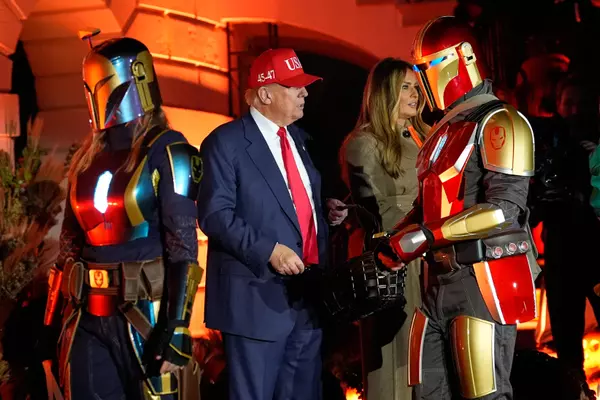Michael Smolens: Bipartisan support builds for migrant legal status. Don’t hold your breath.
It seems Sen. Alex Padilla and President Donald Trump could hardly be farther apart on immigration, especially regarding the administration’s “mass deportation” policy for undocumented migrants.
It may be wishful thinking, but there appears to be a tenuous sliver of common ground.
It was only six weeks ago when the California Democratic senator was wrestled to the ground and handcuffed as he tried to ask a question of Homeland Security Secretary Kristi Noem during a Los Angeles news conference after Trump sent National Guard troops and U.S Marines to the city to quell protests over immigration raids.
As a counter to Trump’s militarized operations, Padilla last week said he was introducing legislation to give legal status to millions of undocumented immigrants in the United States.
“We believe that if you’ve lived here for over seven years, paid taxes for years, contributed to your community for years, and you don’t have a criminal record, then you deserve a pathway to legalization,” Padilla said.
The previous week, Reps. María Elvira Salazar, R-Fla., and Veronica Escobar, D-Texas, introduced broader immigration reform legislation called the “Dignity Act” that, among other things, would grant similar legal status.
State Senate Republican leader Brian Jones of Santee and GOP Assemblymember Laurie Davies, who represents a portion of north San Diego County, recently expressed concern about the impact the raids are having on key industries in a letter to Trump and asked him to make some accommodation for undocumented workers.
Alas, bipartisan proposals like these have come and gone for decades with no substantial action.
Trump, who won the election in part by promising the aggressive deportation campaign now unfolding, has also talked about allowing long-term undocumented workers to remain following complaints from the agriculture and hospitality industries that his enforcement actions are depleting their workforces.
The administration’s actions so far to streamline issuing temporary visas don’t do that. And Trump’s record on following through on such promises is dubious.
Since his first term, he has talked about helping people who receive temporary legal status under DACA, the threatened Deferred Action for Childhood Arrivals program created by President Barack Obama.
That has not happened. In fact, the administration has sought to strip the half-million DACA recipients of benefits and this week said they “are not automatically protected from deportation” and urged recipients to “self-deport.”
Trump tried to end the program by executive order during his first administration, but the courts have so far largely blocked such action.
Trump certainly can point to success on virtually stopping cross-border illegal immigration and slowing legal migration. That, along with the high-profile raids and confrontations with protesters, would seem to put him in a “Nixon goes to China” position to legalize longtime migrant workers.
But Trump’s discussions about legal status have rankled much of his MAGA (Make America Great Again) base. A lot of those folks are further incensed that he has not released files regarding people involved with deceased convicted sex offender Jeffrey Epstein.
Making further concessions on undocumented workers already in the country would likely further inflame that crowd. But he keeps talking about it, and in the process, trying to have it both ways.
“I’m on both sides of the thing,” Trump told Fox News a month ago. “I’m the strongest immigration guy that there’s ever been, but I’m also the strongest farmer guy that there’s ever been. And that includes also hotels and, you know, places where people work.”
“We’re going to have a system of signing them up so they don’t have to go,” he said. “They can be here legally, they can pay taxes and everything.”
Many of those unauthorized workers already do pay taxes, but generally don’t qualify for many benefits that they pay for, such as Social Security and Medicare.
With no sense of irony, Trump recently bemoaned the treatment of undocumented workers, some of whom have faced harsh treatment under his policies.
“You had cases where…people have worked for a farm, on a farm for 14, 15 years and they get thrown out pretty viciously and we can’t do it. We gotta work with the farmers, and people that have hotels and leisure properties too,” he said at the Iowa State Fairgrounds in Des Moines four weeks ago.
The Trump administration has launched a new effort to streamline visas for temporary migrant workers. But the program under the newly created Office of Immigration Policy won’t help those who are in the country illegally to stay or get work visas, which officials said was barred by current immigration law, according to Axios.
New visa recipients would have to have their paperwork completed in their home country before legally migrating to the U.S.
“This is not amnesty. It’s not amnesty lite,” a senior administration official told Axios. “No one who is illegally here is being given a pathway to citizenship or residency.”
“Amnesty” is a trigger word for hardliners on illegal immigration, though it means different things to different people. Backers of reform try to avoid it at all costs.
“No amnesty. No handouts. No citizenship,” Rep. Salazar said of the Dignity Act. “Just accountability and a path to stability for our economy and our future.”
On one level, the fight over immigration has been somewhat theoretical for years. The nation’s broken immigration system caused real hardships for migrants, negative impacts on some agencies and communities, and chaos at the border.
But the nation has been reliant on undocumented workers for so long that there was a widespread, largely unspoken agreement to allow them to stay illegally, if not under the best conditions. To not do so, it was thought, would be a threat to the economic and social fabric of the United States.
We’re now starting to experience that in real time.
Categories
Recent Posts










GET MORE INFORMATION


